

Мебель для кукол до 55 см - страница 2. Pts why play is important. Play based learning statement EN. ThePowerofPlay. Learning through play ey. A more humane approach. Things in simple language. INTRODUCTION THE NEW LAWS OF PSYCHOLOGY extract. The Giants Accidents. Гиппенрейтер Как общаться с ребенком. Rhymes fingerplays. Math Fingerplays and Chants. Songs stop look listen think lyrics final 2012 06 05. CELL Todd Rhy Sound Aware. Inclusion Development Programme Behaviour Emotional Social Difficulties.
Why play-based learning? (free article) - Early Childhood Australia. 6 Types of Play: How Children's Play Becomes More Social. Play is a serious business.
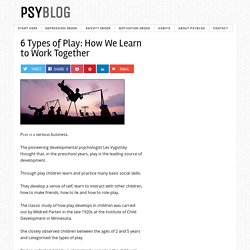
The pioneering developmental psychologist Lev Vygotsky thought that, in the preschool years, play is the leading source of development. Through play children learn and practice many basic social skills. They develop a sense of self, learn to interact with other children, how to make friends, how to lie and how to role-play. The classic study of how play develops in children was carried out by Mildred Parten in the late 1920s at the Institute of Child Development in Minnesota. She closely observed children between the ages of 2 and 5 years and categorised the types of play. Parten collected data by systematically sampling the children’s behaviour. The thing to notice is that the first four types of play don’t involve much interaction with others, while the last two do. Unoccupied play: the child is relatively stationary and appears to be performing random movements with no apparent purpose. » This is part of a series on 10 crucial child psychology studies.
Getting the right balance between adult-led and child-initiated learning. As an early years practitioner you will know the importance of creating the right balance between adult-led and child-initiated learning.
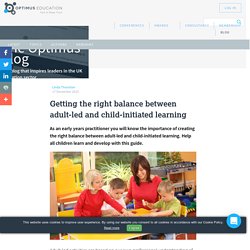
Different types play. Train fingerplay. Transportation Songs Pre K. Facebook Clinic Week 1 23 03 17. How Children Learn to Talk. Have you ever wondered how children learn to talk?
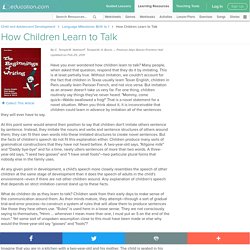
Many people, when asked that question, respond that they do it by imitating. This is at least partially true. Without imitation, we couldn't account for the fact that children in Texas usually learn Texan English, children in Paris usually learn Parisian French, and not vice versa. But imitation as an answer doesn't take us very far. A few more myths about speakers of multiple languages. Does multilingualism cause language delays and identity problems? The British Council's Nayr Ibrahim busts a few more myths about speakers of multiple languages. Myth: Multilingualism causes language delay Raising children bilingually is sometimes believed to cause language delay.
This misconception is based on a separate underlying proficiency (SUP) hypothesis. This theory, now discredited, suggests that languages are stored in separate compartments or containers, which represent half the capacity of the monolingual brain. Does being bilingual make you smarter? Language teacher and researcher Miguel Angel Muñoz explains the latest research on how being bilingual affects your brain, ahead of a British Council seminar in Cardiff on whether learning a foreign language makes you smarter. You can watch the live-streamed seminar on Tuesday, 3 June. More than half the world's population uses two or more languages every day It is hard to estimate the exact number of bilingual people in the world, as there is a lack of reliable statistics . What Parents Can Gain From Learning the Science of Talking to Kids. The widening education gap between the rich and the poor is not news to those who work in education, many of whom have been struggling to close the gap beginning the day poor children enter kindergarten or preschool.
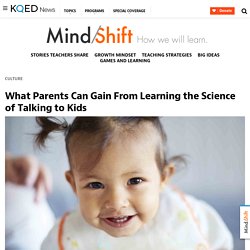
But one unlikely soldier has joined the fight: a pediatric surgeon who wants to get started way before kindergarten. She wants to start closing the gap the day babies are born. When Dr. Dana Suskind began doing cochlear implants on infants at the University of Chicago—a cutting-edge surgical technique that allows once-deaf babies to hear—in her follow-ups with families she noticed a stark difference in how the now-hearing children acquired language. Once they could hear, some children’s language skills thrived and grew, while others languished.
The difference turned out to be the words children heard from their parents and caregivers, millions of them. For Suskind, a lightbulb went on. Bringing Parents On Board Of course, some words are more powerful than others. . * Tune In. Patricia Kuhl: The linguistic genius of babies. Alison Gopnik: What do babies think? How young children learn English as another language. By Opal Dunn, educational consultant and author Introduction Young children are natural language acquirers; they are self-motivated to pick up language without conscious learning, unlike adolescents and adults.
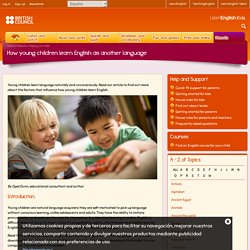
They have the ability to imitate pronunciation and work out the rules for themselves. Any idea that learning to talk in English is difficult does not occur to them unless it’s suggested by adults, who themselves probably learned English academically at a later age through grammar-based text books. Read the notes below about young children learning English as another language. The advantages of beginning early. Earlychildhood NEWS - Article Reading Center. When we first brought our daughter home from the hospital I was inexperienced.
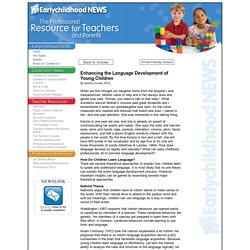
Mother came to help and in her always wise and gentle way said, "Honey, you need to talk to that baby. " What wonderful advice! Mother's counsel paid great dividends and I remembered it when our granddaughter was born. As the nurse measured and cleaned and dressed that brand new soul, I talked to her...and she paid attention. She was interested in this talking thing. Kenzie is one year old now, and she is already an expert at communicating her wants and needs. How can young children best learn languages?
The British Council's Tracey Chapelton explains how parents of young children can lay the foundations for success. Development Matters FINAL PRINT AMENDED.